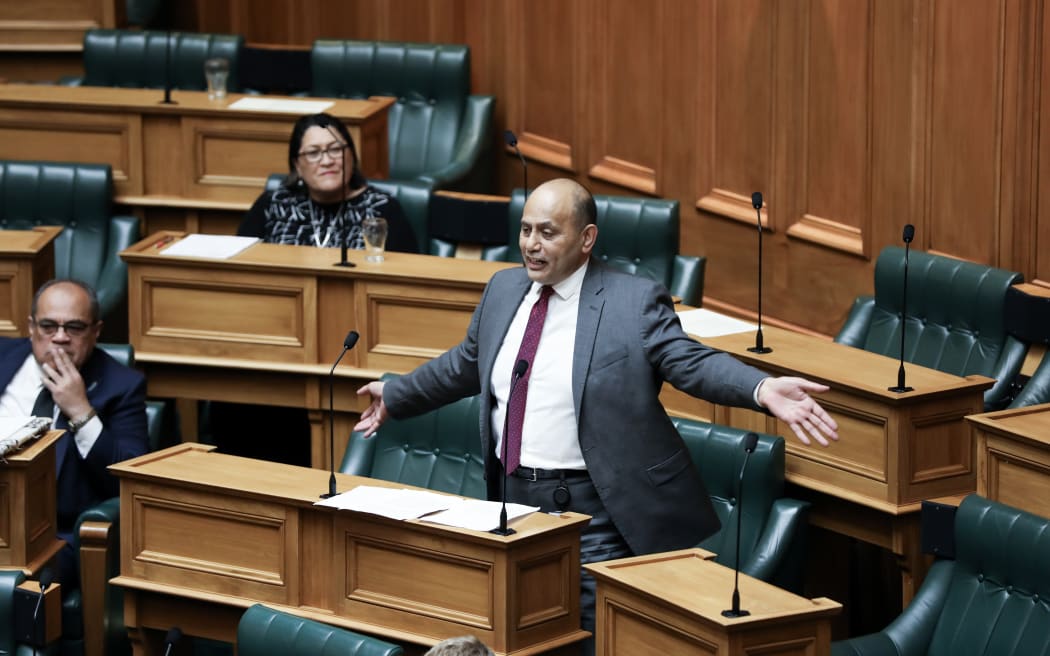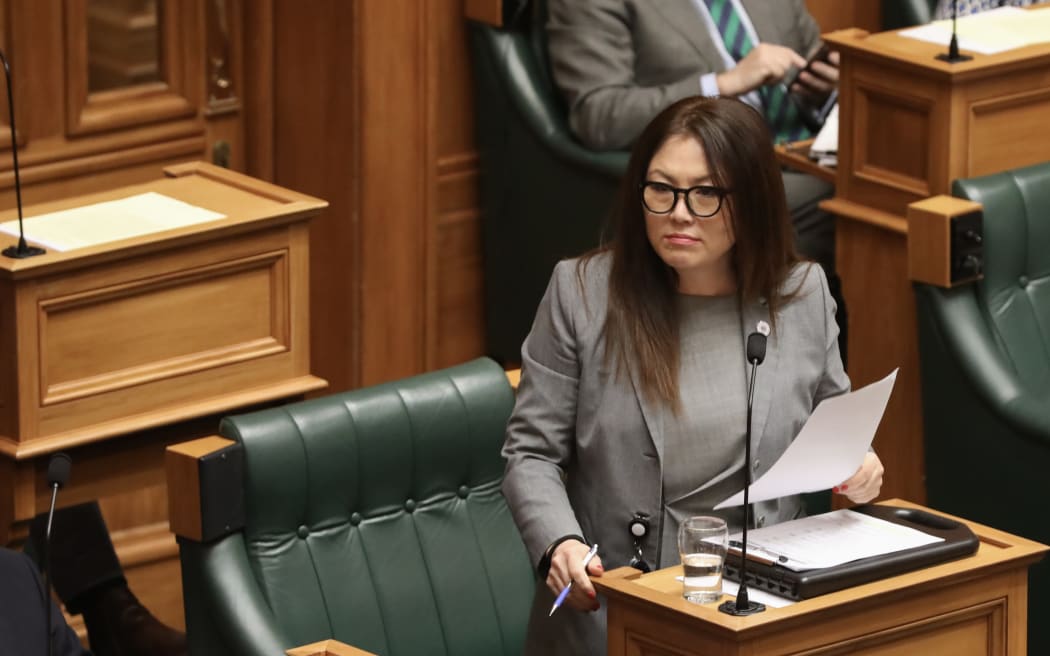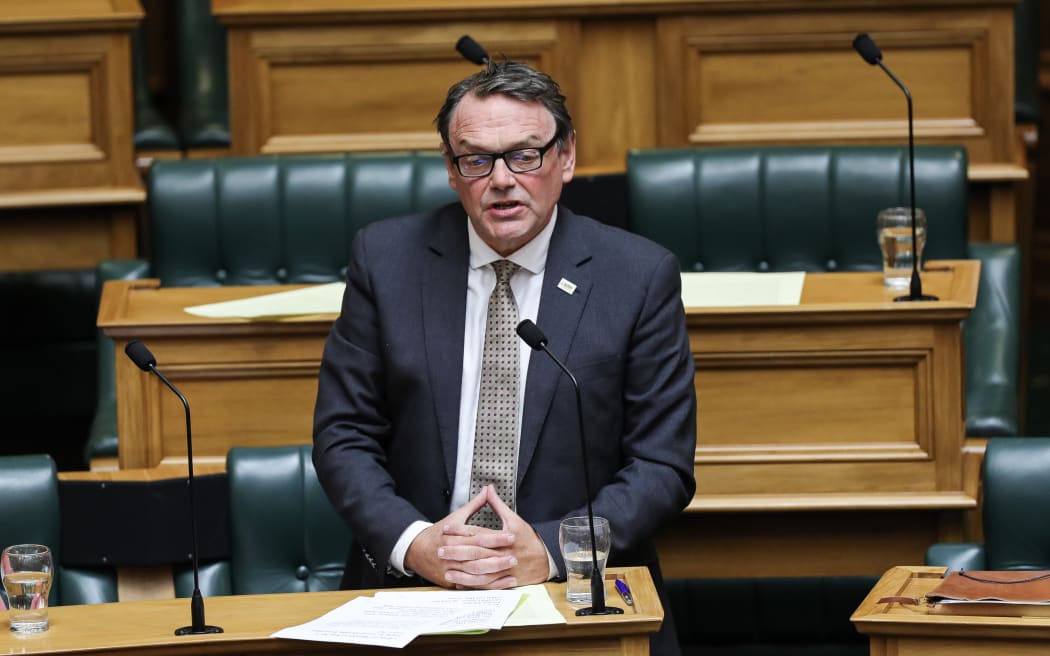Trust in media, or lack thereof, was front and centre as the Minister of Broadcasting had a week of being grilled in parliament's Question Time about the Aotearoa New Zealand Public Media Bill and ended up walking back some of his utterings.
Each day Willie Jackson was questioned by National’s Melissa Lee on whether he stood by all his statements and actions regarding legislation to create a new public media entity out of RNZ and TVNZ. Mostly he did stand by them.

Labour MP Willie Jackson addresses the National Party during the general debate Photo: VNP / Daniela Maoate-Cox
“We no longer have trust in national media. No longer is there trust in what's happening at a national media level,” Jackson told the House on Wednesday.
“We need a trusted public broadcaster, because national identity is incredibly important, and no longer do people trust New Zealand television or New Zealand radio. Our last survey told us that New Zealand radio is the second most listened-to medium; New Zealand television is fourth—second and fourth. So we need a national broadcaster for a great public identity.”
The previous day, Jackson expounded on the government’s rationale for merging Radio NZ and Television NZ, which it sees as a way of fortifying them both against a slow death in relevance during the digital age.
“The most important thing here is that we have a changing landscape in terms of the media. We have people disappearing down rabbit holes. We need to have a trusted public media entity—that's the absolute priority—that reflects all New Zealanders. People can't see themselves. They can't hear themselves.
"They want to see all New Zealanders and hear from all New Zealanders—Māori, Pasifika, Asian, young people. It's not just about the dollars.”
Select Committee
The select committee process in relation to this bill has received many public submissions, and Melissa Lee referred to some of these in her questions
“What response does the minister have to submitters to the select committee who say, and I quote, ‘The editorial independence guaranteed by the bill is illusionary’ and that there is an unacceptable level of ministerial control that transcends anything currently imposed on RNZ and TVNZ?” Lee asked.
“I say those submitters are wrong," Jackson said. "My intention is that the Aotearoa New Zealand Public Media should have extremely strong protections in relation to editorial independence. What is in the bill is intended to strengthen the current editorial independence that TVNZ and RNZ have.
"The crown entities framework provides a well-tested set of mechanisms to enable entities to be set up at arm's length from the government while providing clear, transparent levers to hold those entities accountable for the delivery of their statutory objectives and other responsibilities.”

Photo: VNP / Phil Smith
Quoting Jackson’s own statement at the Economic Development, Science and Innovation Committee - "We need them to change their attitude, we need them to understand what we want" - Lee asked him if that was the sort of interference that submitters raised concerns about.
“That's a sad statement from the member. I absolutely stand by that comment at the select committee, and what we require is a cultural change,” Jackson said.
Commercial media concerns
The Act Party’s Damien Smith chipped in, asking the minister if he agreed with concerns that the establishment of ANZPM would significantly undermine the sustainability and viability of commercial media.
“And has any opposition voiced to the merger by NZME, Stuff, Sky, or TVNZ led to any reconsideration of the government's position on the merger; and does he believe that $109 million in untagged funding for the new public entity is likely, in the words of Stuff, to grossly distort the market; and what responsibility does he think he has, as minister of broadcasting, to leave a thriving, competitive market?”
In response, Jackson said no one wanted to shut out the small players and the new entity would collaborate with others, but that Smith’s questions would be answered at the select committee.

ACT MP Damien Smith in the House Photo: ©VNP / Phil Smith
Back pedalling
Meanwhile, by Thursday 29 September, the third consecutive day of questioning by Lee, the minister was stepping back his claim that New Zealanders no longer have trust in national media, when asked if he stood by it.
“I stand by the sentiment of what I said. However I recognise these statements are open to interpretation, which is fair enough, so let me clarify what I meant. This was no reflection on RNZ or TVNZ but a reflection that the whole media landscape has changed with audiences now more likely to be engaged with streaming services or social media than traditional media; Surveys show RNZ and TVNZ are our most trusted media, but overall, as the opposition knows or refuses to acknowledge, trust in media is slipping both here and internationally, and this government wants to do something about it,” Jackson said.
Meanwhile, research recently conducted by media company Kantar shows that RNZ is the most trusted media organisation in New Zealand, echoing results from Auckland University of Technology’s Trust in News in Aotearoa New Zealand 2022 research earlier this year.

